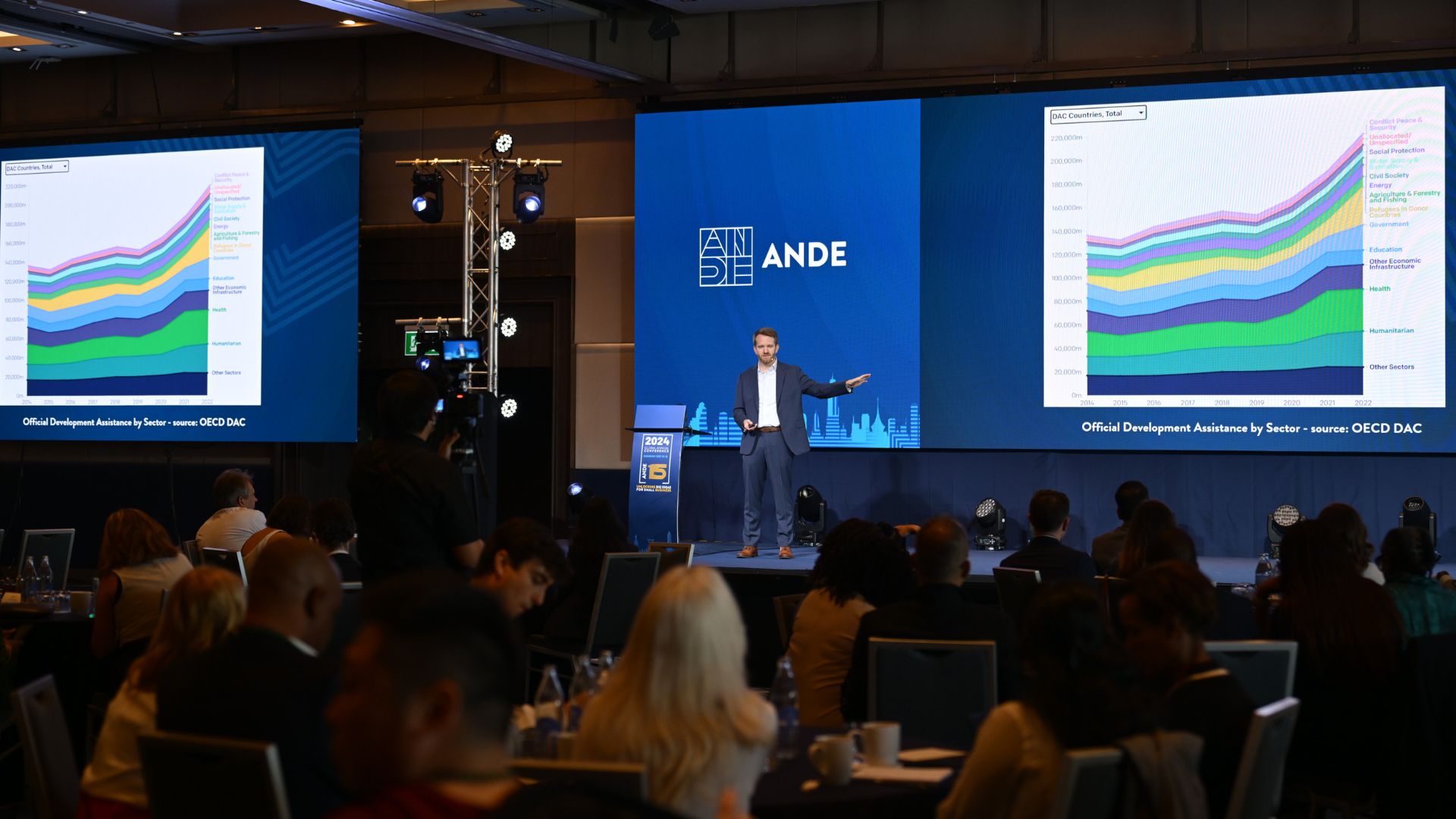
ANDE’s new strategy aims to redefine the path to sustainable prosperity.

Devin Chesney, ANDE’s Interim Executive Director, presented his vision for a transformative development strategy that places entrepreneurship at its core. By fostering local ecosystems and evidence-based programs, ANDE aims to redefine the path to sustainable prosperity.
From Bretton Woods to Bangkok: Tracing the Roots of Development Thought
Devin Chesney, ANDE’s Interim Executive Director, has an ambitious vision for development. During his opening remarks at the ANDE Annual Conference in Bangkok, he drew a throughline from the Bretton Woods conference of 1944 to the present day, charting a path that sheds light on how development thinking has evolved—and where it has faltered.
The Bretton Woods meeting, convened in the final years of World War II, laid the foundation for the International Bank for Reconstruction and Development (now the World Bank Group), the International Monetary Fund, and the OECD. These institutions and the subsequent Marshall Plan successfully rebuilt war-torn Europe through extensive financial investment and strategic economic planning. However, as Chesney pointed out, the subsequent shift in development focus—mirroring the European model—prioritized aid for healthcare, education, and infrastructure over entrepreneurship and economic development.
This approach, while necessary, addressed only the symptoms of poverty, not its underlying causes. Currently, only a minuscule 1.7% of global development assistance is funneled through entrepreneurial means. ANDE believes this is a crucial gap. To Chesney, the most direct path to lasting change lies in enabling local businesses to create jobs, build wealth, and foster sustainable prosperity.
Entrepreneurship as a Catalyst: Chesney’s Personal Journey
Chesney’s perspective on development is not just academic; it’s personal. Growing up in Houston, Texas, his family faced poverty after the loss of his father, a situation that instilled in him a firsthand understanding of resourcefulness and grit. Living in a predominantly Mexican immigrant neighborhood, Chesney saw how those on the economic margins developed innovative ways to cope with limited opportunities. These experiences shaped his belief in the power of entrepreneurship as a tool for empowerment and poverty alleviation.
His commitment to this belief led him to launch three companies of his own. Later, reading Jeffrey Sachs’ book The End of Poverty, he was inspired to delve deeper into development work. Sachs proposed a bold, holistic solution: eradicate poverty by simultaneously addressing all its symptoms. The Millennium Villages Project was the culmination of this idea. While it made strides in areas like healthcare and education, it fell short in its failure to spur economic growth—a glaring oversight that revealed the critical need for fostering entrepreneurship within development efforts.
Joining ANDE was a natural next step for Chesney. Founded in 2009 within the Aspen Institute, ANDE recognized the transformative potential of small and growing businesses (SGBs). These businesses are often the backbone of local economies, yet they rarely receive the support they need. Through its work, ANDE sought to build entrepreneurial capacity, advocate for supportive policies, and connect stakeholders to foster a thriving SGB ecosystem.
ANDE Strategy Slide Presentation.
Shifting the Development Paradigm: Evidence-Based Strategies and Localization
For Chesney and ANDE, evidence-based development and localization are the cornerstones of a new strategy. One of ANDE’s most ambitious research efforts, the Global Accelerator Learning Initiative (GALI), has tracked over 23,000 entrepreneurs across various programs worldwide. The data revealed a powerful insight: while most business accelerators positively impact economic growth, 80% of this growth is driven by the top quarter of accelerators. It was clear that certain principles made some support organizations vastly more effective than others.
These findings culminated in the creation of the SCALE principles—a framework designed to enhance the effectiveness of entrepreneurial support programs. The Argidius Foundation, an ANDE member, implemented these principles and saw a dramatic increase in return on investment, from 1.5x to 8-12x. The implications were clear: when done right, supporting entrepreneurship is one of the best value-for-money interventions in development.
 If you were a donor, and I could sell you $10 worth of durable and sustainable economic growth in a low-income place for $1 in grant money, how much of it would you buy?”
If you were a donor, and I could sell you $10 worth of durable and sustainable economic growth in a low-income place for $1 in grant money, how much of it would you buy?”
Devin Chesney
This is the driving force behind ANDE’s new strategy, which stands on two key pillars:
1. Evidence-Based Development
ANDE aims to make its members exceptional at nurturing entrepreneurs and fostering high-growth ventures through data-driven, evidence-based practices. Everything ANDE does, from capacity building to policy advocacy, is rooted in proven principles that maximize impact and drive results. The difference between an average-performing entrepreneurial support organization and a top-performing one is staggering—up to eight times more growth for the businesses they serve.
2. Localization: Building from Within
While many development programs talk about localization, ANDE’s approach is about building local ecosystems that can sustain themselves. This strategy emphasizes empowering local organizations, enhancing their capacity to support entrepreneurs, and fostering networks that allow businesses accessible pathways to get the support they need to grow. Traditional development paradigms often impose external solutions; ANDE envisions a model where SGBs, inherently local by nature, are equipped to thrive and drive economic progress from within.
Chesney emphasizes that ANDE’s focus on localization is not just rhetoric. In regions like India, where a new law mandates corporations to invest a portion of their profits into social causes, there’s an opportunity to channel significant funding into entrepreneurial support. The vision is for SGBs to become a central pillar in the strengthening of local economies and achieving sustainable impact goals.
The Path Forward: Entrepreneurship as a Cornerstone of Development
ANDE’s new strategy represents a departure from traditional aid models. Rather than treating the symptoms of poverty, it emphasizes that entrepreneurship must be a central tool in overcoming it. Supporting SGBs doesn’t just create jobs—it fosters local economies, builds wealth, and drives inclusive growth. Chesney’s reflections show a deep belief that investing in small business entrepreneurs and their own vision for their lives rather than projects imposed from outside, is the key to lasting development.
Chesney calls on the global development community to rethink its approach: “If you were a donor, and I could sell you $10 worth of durable and sustainable economic growth in a low-income place for $1 in grant money, how much of it would you buy?” The answer, Chesney argues, is that much more than the status quo of 1.7% of foreign aid.
As the 2024 Global Conference unfolded in Bangkok, ANDE’s ambition became clear: The impact of ANDE’s network and the evidence it has built over its 15 years of researching and advocating for the sector are a powerful argument for a new development paradigm. With a focus on evidence-based development and building the capacity of local ecosystems, ANDE envisions a future where effective practices and local leadership drive the development sector focused on empowering small and growing businesses to transform their communities from the inside out.
ANDE is prepared to use its collective voice to mobilize greater resources towards the SGB sector and to help the sector scale its work to meet that opportunity. ANDE’s message is both a call to action and a declaration of purpose: small and growing businesses are not just part of the solution—they are the cornerstone for sustainable, inclusive, and locally driven development.
